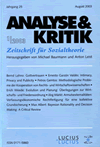ohne Titel

2003 (25) Issue 1
Table of Contents
Title: Gottvertrauen
Author: Bernd Lahno
Page: 1-16
Abstract: Faith in the sense of trust in God is discussed as a somewhat extreme case of trust. Trust in general is understood as an emotional attitude and determined by the way a trusting person perceives the world and the person trusted. Interpersonal trust as the most common form of trust is characterized by connectedness - the trusted person is perceived as acting according to norms, values or goals shared by the trusting person - and by a participant attitude in the sense of Strawson. Trust in God differs essentially from ordinary interpersonal trust, as the asymmetrical relationship between God and a faithful person does not allow for sharing a normative basis of conduct in the strict sense of 'sharing,. Therefore, trust in God is 'categorical' in character: the faithful person acknowledges God's will as the ultimate and binding standard of normative value. Whatever happens, the faithful person perceives it as an expression of God's will, and, thus, as 'good'.
Title: Intimacy, Privacy and Publicit
Author: Ernesto Garzón Valdés
Page: 17-40
Abstract: The article analyses the distinction between the private and the public sphere from a conceptual and from a normative point of view. On the conceptual level, it is argued that the common dichotomous view is incomplete, giving rise to conceptual confusions which can be overcome by a careful distinction between the intimate and the private sphere. While the boundary between the private and the public is a conventional matter, the sphere of intimacy, including thoughts as well as a certain type of actions, is empirically delimited. On the normative level, a number of arguments for or against the extension or restriction of the private sphere as well as for or against the intervention of the state in its citizens, spheres of intimacy is discussed from a liberal point of view.
Title: Methodologische Probleme der Kooperation von Rechts- und Wirtschaftswissenschaft
Author: Petros Gemtos
Page: 41-59
Abstract: Recent developments in economics and the science of law emphasize their cooperation for a better understanding of social structures and interactions, an effective application of social scientific knowledge and a rational evaluation and implementation of social norms. There are, however, difficult methodological problems in this endeavor: Whereas economics is mainly (with the exception of welfare economics) an empirical science which collects information about economic activities and the functioning of the economic system, the science of law is a normative discipline aiming at solving social conflicts and establishing rational principles for judicial decisions. In this paper, we suggest a three-level scheme for the interdisciplinary cooperation of law and economics, addressing the different problems that positive and normative economics face as they apply economic knowledge to legal matters. Economic analysis of law is proposed as a model for a general transformation of the traditionally hermeneutical jurisprudence into an analytic-normative science of law based on theoretical expectation (explanation) and the rational evaluation of the consequences of legal rules and principles.
Title: Evolution und Planung: Überlegungen zur Wirtschafts- und Friedensordnung
Author: Erich Weede
Page: 60-79
Abstract: Although individuals cannot desist from planning, social processes cannot be commanded and controlled successfully. The shortcomings and disadvantages of holistic planning and the likelihood of plan failure can be explained: Scattered knowledge can be mobilized, innovation and effort can be elicited only where planning does not displace economic freedom and competition. The positive effects of freedom and competition and the negative effects of constraining plans can be demonstrated empirically. But freedom and competition require an institutional framework. There is no need to leave the establishment of this framework only to evolution because evolution does not necessarily lead to efficient solutions. That is why some kinds of planning may have a useful, though modest role to play at the rule-making level. Since planners remain fallible in planning constitutions and institutions, competition and some room for evolution remain desirable at this level, too.
Title: Armutsexternalitäten: Verfassungsökonomische Rechtfertigung für eine kollektive Grundsicherung
Author: Jörg Märkt
Page: 80-100
Abstract: This paper analyzes the institution of benefit payments from the constitutional economics point of view. Benefit payments cannot be legitimized only by the veil of uncertainty about the personal future income position. From the constitutional economics perspective, they are only justified if externalities of poverty as a genuine public good problem are taken into account. A system of public benefit payments raise up two problems: first it has to overcome the problem of free-riding with regard to transfer payments, and secondly it should not provide incentives for the beneficiary to restrain the own efforts to work. Hence a double commitment is necessary: On the one hand, this commitment must regulate, in which way a citizen is engaged in the financing transfer payments, and on the other hand it has to include obligations for the potential recipients of the transfer payments to immediately return to working life.
Title: Bayesian Rationality and Decision Making: A Critical Review
Author: Max Albert
Page: 101-117
Abstract: Bayesianism is the predominant philosophy of science in North-America, the most important school of statistics world-wide, and the general version of the rational-choice approach in the social sciences. Although often rejected as a theory of actual behavior, it is still the benchmark case of perfect rationality. The paper reviews the development of Bayesianism in philosophy, statistics and decision making and questions its status as an account of perfect rationality. Bayesians, who otherwise are squarely in the empiricist camp, invoke a priori reasoning when they recommend Bayesian methods - a recommendation that is not justified by their own standards.